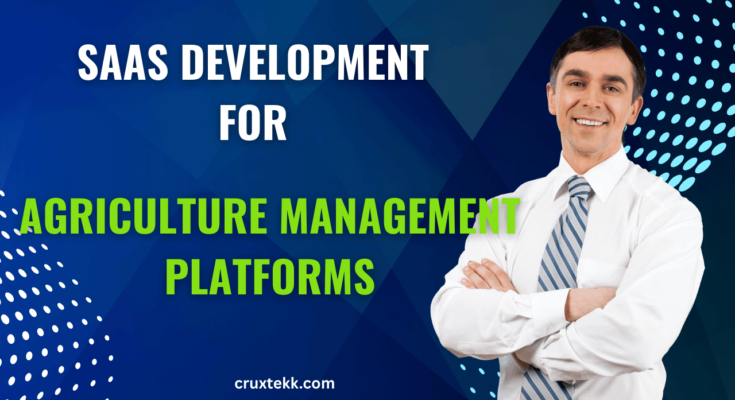The agriculture industry is undergoing a digital transformation, with Software-as-a-Service (SaaS) solutions playing a crucial role in modernizing farm management. SaaS development for agriculture management platforms offers scalable, cost-effective, and efficient solutions that empower farmers, agribusinesses, and stakeholders with real-time data, automation, and decision-making tools.
What is a SaaS-Based Agriculture Management Platform?
A SaaS-based agriculture management platform is a cloud-based software solution that helps farmers and agribusinesses manage various aspects of agricultural operations, including crop planning, irrigation scheduling, pest control, inventory management, and market analytics. These platforms leverage IoT, AI, and big data to provide insights that enhance productivity and sustainability.
Key Features of a SaaS Agriculture Management Platform
- Farm Data Management
- Centralized storage of farm data (soil health, weather conditions, crop yield, etc.)
- Easy access from any device with an internet connection
- Precision Farming Tools
- AI-driven analytics for optimized resource utilization
- Sensor integration for real-time field monitoring
- Automated Irrigation and Fertilization
- Smart irrigation systems based on weather predictions
- Automated nutrient management to enhance crop yield
- Livestock Management
- Real-time tracking of animal health and movement
- Automated feeding and disease detection
- Supply Chain and Inventory Management
- Digital record-keeping for equipment, fertilizers, and seeds
- Integration with supply chain partners for smooth logistics
- Financial and Market Analytics
- Expense tracking and budgeting tools
- Market trend analysis and pricing insights
Benefits of SaaS in Agriculture Management
1. Cost-Effective and Scalable
SaaS solutions eliminate the need for expensive hardware and software installations, reducing upfront costs and offering scalable solutions for farms of all sizes.
2. Data-Driven Decision Making
With real-time data analytics, farmers can make informed decisions, predict crop yields, and mitigate risks related to climate and pests.
3. Remote Access and Automation
Farmers can monitor and manage operations remotely via mobile apps, reducing manual labor and improving efficiency.
4. Enhanced Sustainability
By optimizing resource usage, SaaS platforms help reduce waste, lower environmental impact, and promote sustainable farming practices.
Challenges in Developing SaaS for Agriculture
Despite its advantages, SaaS development for agriculture comes with challenges:
- Internet Connectivity Issues: Rural areas may have limited internet access, requiring offline capabilities.
- User Training and Adoption: Farmers may need training to utilize digital platforms effectively.
- Integration with Existing Systems: Compatibility with legacy farming equipment and software can be a challenge.
Future Trends in SaaS Agriculture Platforms
AI and Machine Learning Integration
Advanced AI models will provide predictive analytics for yield forecasting, pest control, and weather pattern analysis.
Blockchain for Supply Chain Transparency
Blockchain technology will enhance traceability in the agriculture supply chain, ensuring fair pricing and reducing fraud.
IoT and Smart Farming
IoT-enabled devices, such as drones and smart sensors, will continue to revolutionize precision farming techniques.
Conclusion
SaaS development for agriculture management platforms is transforming the industry by improving efficiency, productivity, and sustainability. As technology advances, these platforms will become even more sophisticated, offering farmers innovative tools to optimize their operations. Investing in SaaS for agriculture is not just a trend but a necessity for the future of farming.
FAQs:
1. What is a SaaS-based agriculture management platform?
A SaaS-based agriculture management platform is a cloud-based software solution designed to help farmers and agribusinesses manage operations like crop planning, irrigation, and inventory control.
2. How does SaaS benefit farmers?
SaaS platforms offer cost-effective, data-driven, and automated solutions that improve productivity, reduce waste, and enhance decision-making.
3. What technologies power agriculture SaaS platforms?
Technologies like AI, IoT, blockchain, and big data analytics play a significant role in optimizing agriculture management platforms.
4. Are SaaS platforms accessible in rural areas?
While internet connectivity is a challenge in some rural areas, many SaaS platforms offer offline capabilities and mobile support.
5. What are the future trends in SaaS agriculture management?
The future of SaaS in agriculture includes AI-driven analytics, blockchain for supply chain transparency, and IoT-powered smart farming solutions.




